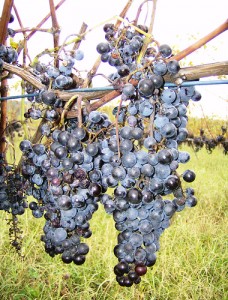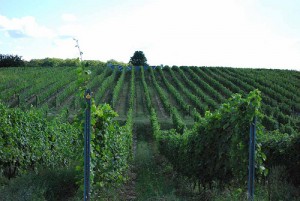
Michigan winemakers look to new varieties to gain “high-quality” status. Photo: bcbeatty (flickr)
As wine grape growers prepare for what many hope will be another strong season, some members of the industry also hope that this year’s crop will reflect innovation.
Experiments with new grape varieties have been underway since 2007 at Michigan State University’s Northwest Michigan Horticultural Research Center in Traverse City. This year, some growers expect to see the first production of wines from at least two varieties of red grapes that are new to the state – teroldego and lagrein.
They’re among a few dozen tested during the past few years in an effort to diversify the wine produced in Michigan, particularly reds.
Michigan reds have been a weak point in the eyes of judges and critics, said Lee Lutes, a winemaker and general manager of Black Star Farm winery in Suttons Bay.
While Michigan whites are classified as high-quality, its reds aren’t regarded as highly, Lutes said.
“Most red wines are from warm weather climates and red grapes take a longer time to ripen,” he said. “So we need some varieties that can not only survive in our cooler climate, but also ripen quickly.”
Although these new varieties will be harvested in the fall, the wine they produce won’t hit shelves for at least another year.
Teroldego and lagrein are two of dozens of varieties tested, most from northern Italy, Austria and southern Germany, MSU Extension regional viticulture educator Duke Elsner said.
Among the others cultivated by MSU are grüner veltliner, zweigelt and dornfelder – commonly grown in Europe without a strong foothold in the U.S., as well as some hybrid varieties.
The goal is to find varieties that could thrive in cold weather and produce wine that isn’t widely available in the U.S., said Elsner, who is based in Suttons Bay.
They aren’t as well recognized as staples such as chardonnay and pinot grigio, Elsner said, but some are slowly catching on in restaurants throughout the state.
“We’re working on getting them out there,” he said. “It takes a while to break a new one in, but some are becoming a commercial interest.”
MSU uses nearby wineries, including Black Star Farms and Chateau Chantal in Traverse City, to take the new grapes for the proverbial test drive.
Brian Hosmer, a winemaker at Chateau Chantal, is finishing the wine made from the MSU grapes, and said it looks

Michigan white wines earn high marks from wine critics. Photo: cletch (flickr)
promising.
Hosmer is making wines with seven types of grapes. Other wineries are working with the new grapes as well and are at various stages of production.
“Some of them are brand-new,” Hosmer said. “Some have been made into wine commercially and some are still getting through the trial stage to see if they can survive in the climate we have.”
Michigan’s proximity to water and its climate help it rank within the top 10 states for grape production and acreage. The majority of wineries are along the west coast where the lake effect keeps the climate more consistent, something crucial when growing grapes, Lutes said.
The number of wineries and wine grape acreage has doubled during the past decade, and Elsner said if these experiments are fruitful, grapes can be grown in more areas of the state.
Elsner said that, in turn, should lead to further growth in the industry.
“We’ll continue to grow and we’ve got a lot of space available,” he said. “It’s still a hot item and probably will be for a while.”
Pingback: Wine news 25th May | winearcana.com